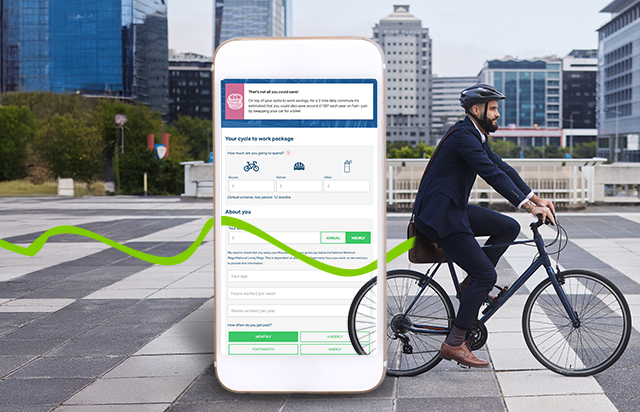Employee Benefits: Everything you need to know

Employee benefits have never been more crucial. Our recent research into how employers can support their staff through the cost-of-living crisis uncovered a vital solution for easing financial pressure on workers: employee benefits.
With 79% of employers and 65% of employees agreeing that benefits are key to managing financial stress, and 83% of chief HR officers highlighting turnover as a significant issue, it’s clear that enhancing your benefits package can play a critical role in retaining talent and supporting your employee’s wellbeing. With a staggering 53% of employees saying their employer could do more to support them, the message is clear: now is the time to step up and provide the support your employees need.
"Clients do not come first. Employees come first. If you take care of your employees, they will take care of the clients." Richard Branson
In this complete guide to employee benefits for UK Employers we address why this discrepancy is an issue for employers and how using an employee benefits platform like ours here at BHN Extras, gives you a cost-effective, hassle-free, workplace benefits hub that will help you support employees' mental, physical, and financial wellbeing.
Read on to discover:
- - What employee benefits are
- - Why employers should offer employee benefits
- - The core benefits every employer should be offering UK employees
- - What your business can gain from having a strong employee benefits package
- - A breakdown of the most sought-after employee benefits.
- - How to implement an awesome benefit scheme
Ready to create a happier, healthier, and more productive workplace? Click here to join BHN Extras for free; likewise, you can click here to contact us if you have any questions or queries.
What are employee benefits?
The Chartered Institute of Personal Development (CIPD) defines employee benefits as the 'perks' an employer offers to supplement a basic salary compensation package (e.g. salary, bonuses, and sales commissions).
Employee benefits are the fantastic extras you offer to sweeten the deal just beyond a salary. Think of them as the cherry on top of the cake that makes working for your company irresistible!
There are two types of employee benefits:
1. Statutory employee benefits - the mandatory benefits that employers must provide to their employees as a legal requirement.
2. Voluntary or Flexible employee benefits - extra incentives and perks that employers can choose to offer to create a larger benefits package, for example, salary sacrifice schemes Home & Tech and Cyclescheme.
Employee benefits really matter because they help you attract and retain top talent, boost morale and keep your team motivated. Plus, they show that you care about your employees’ wellbeing.
Ready to see how an awesome benefits package can make a difference? Click here to create a free BHN Extras account, or if you have any questions feel free to reach out through our contact form here.
When did Employees Benefits get so popular?
Employee benefits aren't a new concept. In fact, employee benefits were first introduced at the beginning of the 20th century. Just after the Second World War, the welfare state was established which gave workers access to the state pension scheme, sick pay, unemployment insurance, and the National Health Service (NHS).
Today, people want and expect so much more than statutory employee benefits. In a post-pandemic era coupled with the cost-of-living crisis, employees need their employers to take a more modern approach and provide perks that help improve and support their financial and mental wellbeing.
Although some companies have improved their benefits packages to suit the modern employee, many still haven’t, with just 5% of employees saying their employers are doing enough to support them.
It is really easy to offer a flexible range of unique employee benefits. Here at BHN Extras, the only FREE employee benefits platform in the market, we enable business owners like you to offer a whole range of amazing employee benefits, all easily set up and managed in just a few clicks.
To find out more about BHN Extras, click here to sign up for free. Likewise, if you have a question or query feel free to contact us by clicking here.
What are the perks of offering flexible employee benefits?
An attractive employee benefits package is a win-win for everyone. Here’s why:
Attract the best talent
Our research shows that 97-99% of employers believe supporting employees during tough times, like the cost-of-living crisis, helps attract and retain talent. And, not surprisingly, a huge 85% of employees agree! Plus, 58% of workers are happy to switch jobs if it means they get better benefits. Want to bring the best people on board? Offer great perks!
Retain your employees
87% of employers surveyed also agreed that benefits helping staff manage their cost-of-living can retain talent, and nearly three-quarters (74%) of employees agree. This is a really important stat for businesses and one that could make a huge impact, as 83% of chief HR officers stated that turnover is a significant problem. A well-rounded benefits package that supports your staff with their everyday living costs can be a game-changer in improving employee retention.
Save money
Offering benefits can lower tax and National Insurance contributions for both you and your employees. This is because some employee benefits (including all salary sacrifice schemes like Cyclescheme) attract tax allowances to encourage take-up.
Other popular salary sacrifice schemes include discounted Gym Memberships, green car benefit, and savings on home & tech items - all available with BHN Extras.
To get the latest advice on tax-free employee benefits and more information on those that are eligible for tax allowances, contact us.
Improve employee work-life balance
Work-life balance is key to job satisfaction. Extra benefits like flexible working and extended holiday allowance can really help improve employee work-life balance, which in turn helps to reduce stress, boost morale, and improve and maintain employee wellbeing and mental health.
As well as this, offering your eligible employees the option of hybrid working will also really help to improve work-life balance. In fact, as of 2023, 78% of employers are already offering the option to work from home.
Boost employee engagement
Awesome perks don’t just benefit the employee. Employers get a great deal too as happy employees work harder, are more engaged and likely to stay working for you for longer. Healthier employees take fewer sick days, are happier at work and feel less stressed.
The CIPD reports that employee benefits are an effective way to enhance staff engagement, too. Employees that are most happy with the workplace benefits on offer estimate their engagement levels to be 11.5% higher than the average and more than 25% higher than the least satisfied employees.
Ready to transform your employee benefits package and boost your team's satisfaction and retention? Contact us today to learn more about how BHN Extras can help!
Core Employee Benefits You Should Offer
Statutory Pensions
It is a legal requirement for all employers to join a workplace pension scheme and automatically enrol all of your employees if they:
- are classed as a ‘worker'
- are aged between 22 and State Pension age
- earn at least £10,000 per year
- usually (‘ordinarily') work in the UK.
In line with the Pensions Regulator, 8% of an employee's monthly wage should be paid into the scheme every month. Employers must pay at least 3% of this, but can opt to pay more.
Statutory Holidays and Time Off
Employees are entitled to the following statutory paid annual holiday and time off work:
- Annual leave: Most employees who work a five-day week must receive a legal minimum of 5.6 weeks' (28 days) paid leave each year. Employers can include bank holidays as part of statutory annual leave.
- Maternity leave: Eligible employees can take up to 52 weeks statutory maternity leave. Government guidelines state that employees must take at least two weeks after the birth. Find out more here.
- Paternity leave: Eligible employees can take either one week or two consecutive weeks leave. Employees may qualify for Shared Parental Leave and Pay. More details are available here.
- Carers leave: This entitles employees who provide or arrange care for a dependent alongside their paid work to one week unpaid leave per year. Discover more here
- Jury duty service: You must let an employee have time off for jury service. Although you don't have to pay employees while they're doing jury service, many employers do. Find out more here.
Flexible financial benefits
Arguably, financial benefits are some of the most desirable perks you can offer as an employer. With rising inflation and the cost-of-living crisis still posing a big challenge for most employees, offering flexible financial benefits is a great way to ease the hardship.
Some really great financial benefits that will actually help your staff save money include:
- Discounted gift cards: Through BHN Extras you can help your employees shop and save up to 15% with big name retailers with gift cards at a discounted price.
- bYond Employee cashback card: Staff can earn up to 15% cashback on everyday purchases using our prepaid shopping card, bYond. Available when you join our free benefits platform, BHN EXtras.
To help your employees save money and earn up to 15% cashback on their shopping, join BHN Extras today for free. Contact us or click here to get started.
Home & Tech Scheme
Home & Tech is another amazing salary sacrifice benefit from BHN Extras. This hugely popular benefit helps make furnishing your home, or buying the latest phone, more affordable as it helps your employees save up to 8% on 1000s of items at leading retailer IKEA and Curry’s, and spread the cost interest free.
This non-cash benefit is a great addition to any employee's benefit package because it’s quick and easy to set up, appreciated by all your staff and, thanks to the tax and national insurance savings you’ll make, it’s actually cost-neutral to run!
Connect with your employees by adding Home & Tech to your benefits package. Click below to get started and sign up for free, or give us a call to see what other benefits your staff will love.
To find out more about Home & Tech contact us or click here to get started for free.
Flexible health & wellbeing benefits
Offering flexible health and wellbeing benefits is an easy and sure-fire way to show your employees you care about them. A huge 95% of companies believe that employers have a responsibility for the health and wellbeing of their employees, so it’s not surprising that some of the health benefits below are the most popular in the workplace.
Popular healthcare benefits you can consider adding to your employee perks include:
- Employee assistance plans
- Eye care vouchers
- Private medical insurance
- Dental insurance
- Occupational sick pay
- Access to counselling
- Wellbeing days
As well as the above, companies should also consider salary sacrifice schemes, such as Cyclescheme and MyGymDiscounts, these are both fantastic health and wellbeing benefits that are really favoured with employees. Read on below for more information on these popular benefit schemes.
Cyclescheme
Cyclescheme is a salary sacrifice benefit that helps your staff save up to 42% on the cost of a new bike and cycling equipment. This amazing benefit is a great way to help your staff save money, improve staff health and wellbeing through regular exercise and, thanks to the tax savings you get as an employer - is actually cost-positive to offer!
Want to get your employees rolling with Cyclescheme? It’s free to join and really easy to set-up. Just click below to get started, or give us a call and our helpful team of benefits experts will get you going.
To find out more about Cyclescheme contact us or click here to get started for free.
MyGymDiscounts
MyGymDiscounts offers employees up to 25% off gym memberships at over 3,000 gyms, leisure centres, health clubs, fitness studios and bootcamp classes across the UK. Suitable for both new and existing gym users, MyGymDiscounts can be used at thousands of fitness centres across the UK, guaranteeing a class or location to suit everyone. With no admin or payroll approvals, MyGymDiscounts is also really easy to set up and manage, making it a firm favourite for both employers and employees!
Ready to boost your staff wellbeing with Cyclescheme and MyGymDiscounts, plus many other fantastic employee benefits? Join BHN Extras for free today.
To find out more about MyGymDiscounts contact us or click here to get started for free.
Company cars and car allowances
If travel is part of your team’s role, then consider supporting them with a company car or car allowance. These extra benefits help make the costs associated with travelling for work more affordable for your staff.
You can really go the extra mile when it comes to supporting your staff with ongoing personal and work related car expenses by joining BHN Extras and offering Green Car Benefit, just read on below for more details.
Green Car Benefit
Green Car Benefit is another hugely popular salary sacrifice scheme that helps your employees buy an ultra low emission vehicle, at an affordable monthly amount, with no deposit or risk of depreciation.
This loved benefit encourages sustainable travel and is a total car solution, meaning it can include car, insurance, road tax, MOT, servicing, replacement tyres and more. Thanks to the tax and National Insurance savings, Green Car Benefit is an affordable way for your staff to get their hands on the next generation of ultra low emission vehicles and is a cost-positive benefit for you to offer!
Get your team on the road and join BHN Extras for free. Or, to find out more about this amazing perk, and the other tried and tested and hugely loved benefits from us here at BHN Extras, then give us a call.
To find out more about Green Car Benefit contact us or click here to get started.
Which employee benefits do staff value the most?
Our research into helping staff stretch their salaries further found that almost a quarter of employees are using their benefits more as they navigate rising costs in a time of uncertainty. Research into the employee benefits and incentives that matter most to workers in the UK show that it’s the little extras that help work-life balance and ease financial strain make all the difference.
These are the top things that employees want support with the most:
1. Groceries (51%)
Rising prices of everyday goods is the second biggest worry employees have surrounding the cost-of-living crisis, so helping staff with the cost of groceries with benefits like bYond cash back card, which earns up to 15% cash back at many UK retailers including Sainsburys, is a great way of helping your team afford more.
2. Travel to work by car (37%)
Commuting is becoming more and more expensive, so benefits like the Green Car Initiative are hugely popular. They help save staff money on buying and maintaining an eco-friendly vehicle, making travel to work more affordable.
3. Technology (30%)
The latest gadgets and home luxuries are expensive. With Home & Tech, employees can save up to 8% on technology, appliances and homeware at leading retailers IKEA and Curry’s, then spread the cost, interest-free over 12 months.
4. Childcare (29%)
Childcare costs are a significant concern for working parents. Offering benefits that help with these expenses can provide much-needed financial relief, making it easier for employees to balance work and family responsibilities.
5. Gym membership (26%)
Health and fitness benefits, such as MyGymDiscounts are highly valued. These perks support employees' physical and mental wellbeing, helping them stay healthy and reduce stress.
The key to meeting the needs of a diverse workforce is understanding that not every benefit will suit every employee and that offering a wide range of flexible benefits is so important if you want to avoid under utilised benefits, unmotivated employees and wasted time and resources. Flexibility is the key to a reduction in unnecessary business costs and a happy workforce, it also shows them that you’re listening.
How to implement a winning employee benefit scheme
Offering a truly incredible employee benefits package, full of perks that your staff will love and use, isn’t difficult - not with BHN Extras anyway!
We get that many companies simply don’t have the resources, time, or budget to put in place an impressive employee benefits programme. That's where we come in.
Here at BHN Extras, we offer a range of workplace benefits your employees actually want and need, all available for you to select quickly and easily on our free, easy to use benefits platform. This simple solution is an absolute game changer for companies looking to do more for their employees and it’s already trusted by a huge number of organisations from large enterprises and SMEs, to small start-ups.
With no per-person fee and no upfront costs, there’s every reason to join BHN Extras and boost your employees' benefits. As well as being free to join, BHN Extras saves you and your employees money, it’s hassle-free and provides access to a range of flexible, personalised workplace benefits.
Ready to be an awesome employer and offer your team the very best benefits?
Get ready to see the difference an amazing benefits package can make. Join BHN Extras online for free today by clicking here, or to chat more about the wide range of benefits we offer, call us on 0208 159 9430 or email us at enquiries@workplaceextras.com.
You might also like these article...
.png)
Energy price cap review: How employers can support with rising bills
Read the article
How to use trivial benefits in the workplace
Read the article
Cycle to Work scheme calculator: How much can your employees save on a new bike?
Read the article